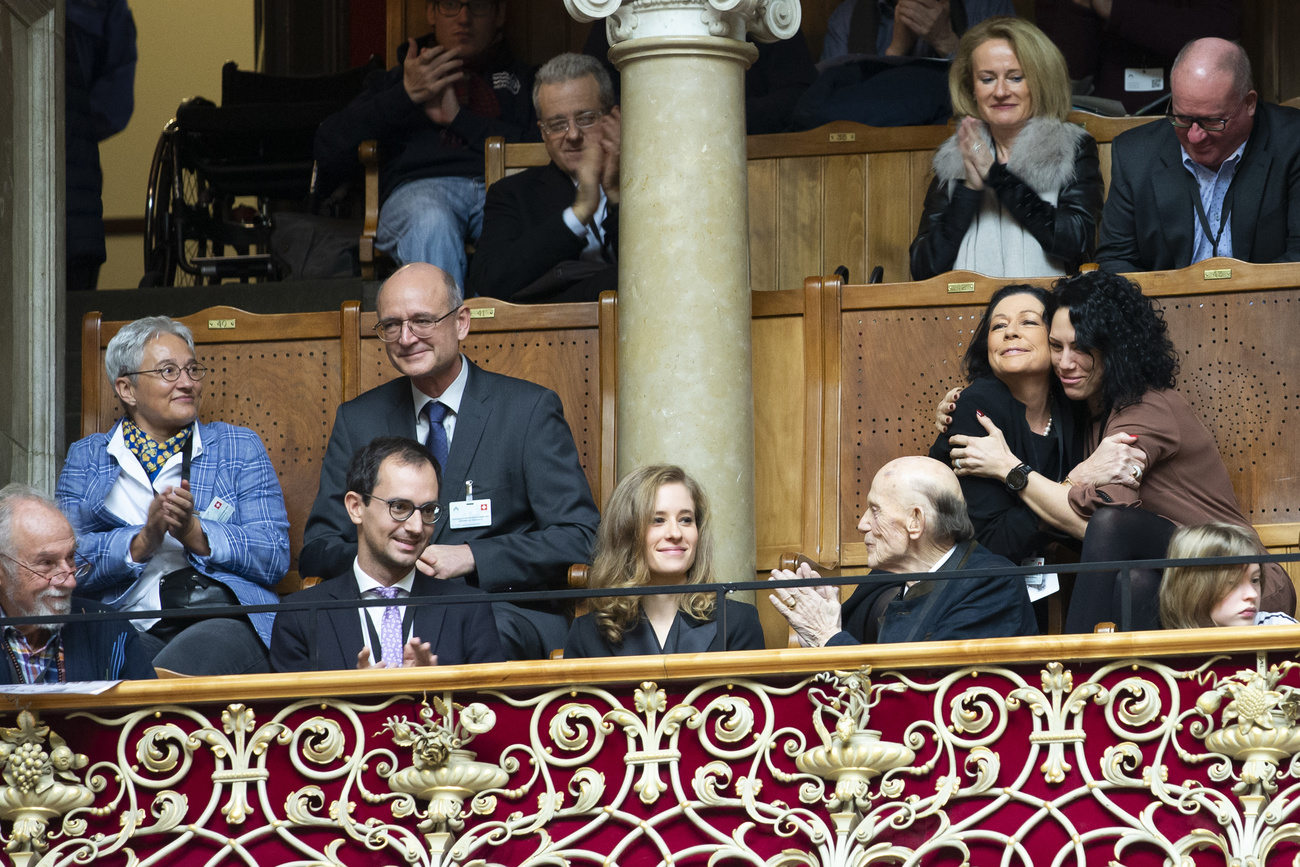Election of judges: Campaigners say system is flawed

Proponents of the ‘justice initiative’ want to choose the members of Switzerland’s top court by lot rather than in an election by parliament.
They argue it would de-politicise the election process and ensure the separation of powers.
Political parties have too much influence on the process, according to Karin A. Stadelmann, a member of the initiative committeeExternal link.
A lecturer in social work, she is president of the local chapter of the Centre Party in the city of Lucerne.
SWI swissinfo.ch: Does Switzerland have a problem with its justice system?
Karin Stadelmann: Not directly with the judiciary, and not with the federal judges themselves. They do a very good job and produce balanced judgments. However, we have a systemic problem with how people get to the highest judicial posts in this country. The ‘justice initiative’ was launched to address this.
SWI: In international comparisons, Switzerland always ranks very high in terms of judicial independence. In other words, the problem can’t be that pressing?
K.S.: There are opposing views. For example, if you look at what the GrecoExternal link (the Council of Europe’s Group of States against Corruption, ed.) criticises, the situation looks different.
The political nature of the allocation of posts and the retention of the mandate tax to political parties violates the principle of judicial independence.
SWI: Political influence also exists elsewhere. Can the initiative in any way initiate a complete de-politicisation of the judiciary, or will that remain a pious wish?
K.S.: Everyone has a political opinion and should be allowed to express it. But if he or she belongs to the judiciary, then they must certainly be able to act independently of politics. And that is best guaranteed if they can do so independently of political parties and do not have to be a member.
If the initiative is accepted, a judge would still be allowed to be a party member. As far as I’m concerned, there’s nothing wrong with joining a party out of one’s own conviction.
But you have to see that the administration of justice would be better accepted if people knew: The judges who pass judgement do not belong to any party and the electoral system for appointment as a federal judge is possible regardless of party affiliation. And that is what we are ultimately concerned with.
SWI: Is it so problematic if the highest judicial posts are distributed according to party-political proportional representation? The opponents of the initiative say that this would represent the entire political spectrum.
K.S.: There are two ways of looking at it: At the moment, this party proportional representation only covers political views; other aspects are of secondary importance. The vast majority of the Swiss electorate does not belong to any party. This circumstance is not covered in the current system.
SWI: Courts increasingly decide political issues. Isn’t indirect political coverage – as we have today – all the more desirable?
K.S.: Judges don’t decide at all on the basis of political criteria in every case; the facts on which the court cases are based cannot simply be used for that.
If there is a particularly politically sensitive issue, then it is certainly good if different political opinions are taken into account in the judgement. But that’s just it: The party-politically independent orientation is missing today. And this could be just as valuable, depending on the circumstances.
SWI: The initiative also proposes a lottery procedure, which is controversial. Can the lottery guarantee diversity better than the election body for federal judges, the parliamentary court commission?
K.S.: It is not simply a matter of using a lottery to pick the desired number of people out of a pot. It’s about making a selection from a group of suitable and tested candidates, who are appointed by a specially appointed expert commission.
We know from other areas that if the recruitment and selection processes are designed objectively, then more people apply for a job and there is also greater diversity among them.
Those who are suitable are then put into a balanced pot, where the lottery comes into play. It is therefore a matter of opening up the field for the capable candidates.
SWI: Under the current system, the court commission proposes the judges, and their nominations are rubber-stamped by parliament. This means that the members of the commission are politically accountable – this would not be the case with a lottery. Isn’t that problematic?
K.S.: No, this accountability would no longer be necessary. There would be the expert commission that would make the proposals. Of course, they could sometimes suggest someone who in retrospect might turn out to be unsuitable, but I don’t think that’s often the case. It will be better than it is today.
The lot guarantees a broader participation in the application process. The expert commission decides independently and attaches importance to professional qualifications and not to party affiliation.
SWI: The expert commission called for by the initiators would be put together by the government, the members would have a great deal of power, but would have considerably less political legitimacy than the current parliamentarians in the court commission. Isn’t that questionable?
K.S.: Why should that be questionable? The point is explicitly that they are selected experts – from the academic world, from court practice, but also HR experts – and not politicians.
It is still to be decided in the legislative process how this commission is specifically structured, and how we ensure that other criteria are taken into account in its composition in addition to linguistic ones.
SWI: In this way, however, responsibility would be transferred from the legislature to the executive. That is no less problematic in terms of the separation of powers, isn’t it?
K.S.: The mandate to appoint a body of recognised experts means that the government cannot act as it pleases. Nor can it do as the parties see fit.
For example, when the government commissions a report on the evaluation of a new law, it also turns to people with specific competencies. For me, they have to be people who know their field, who deal with electoral processes or personnel decisions, and who do not represent the interests of parties or individual government ministers.
SWI: Should judges themselves also be represented on the expert commission?
K.S.: Probably not. Of course, they should also be able to make non-binding recommendations, as is normal in other recruitment processes. But it should not be a body of judges that co-opts itself.
SWI: The initiative envisages a one-time election to the highest judgeships in order to avoid a disciplinary effect through re-election. However, this would give individuals significantly more power – and their election would become a political issue all the more. Just take the example of the US Supreme Court.
K.S.: This re-election every six years, as it takes place today, is highly problematic. This is because the parties can exert a lot of pressure if the judges make decisions they don’t like.
If a judge doesn’t have to stand for the re-election and the office can be administered until retirement (according to the text of the initiative until ‘five years after reaching the normal retirement age’, editor’s note), this means of pressure is automatically eliminated. Thus, the process is rather de-politicised.
SWI: The Swiss system has another peculiarity that is the subject of much criticism, especially from abroad: a financial contribution that judges have to make to their parties. A new proposal wants to abolish this ‘mandate tax’. Do you welcome this step?
K.S.: Our initiative text says nothing about this issue, because the question becomes obsolete with the abolition of the de facto compulsory party affiliation. If a judge continues to be a member of a party voluntarily, then he or she can make contributions, as is the case with other members.
Mandate taxes are, among other things, an important source of income for parties.
The link between contributions and consideration, is to be questioned in the context of the judiciary. I trust the parties that they have diversification instruments in the procurement of financial resources, but further solutions must be found.
Interview adapted from German/urs
Senator Andrea Caroni fights against the ‘justice initiative’. In an interview with swissinfo.ch he explains the reasons.

More
Opponents say ‘justice initiative’ has glaring flaws

In compliance with the JTI standards
More: SWI swissinfo.ch certified by the Journalism Trust Initiative













You can find an overview of ongoing debates with our journalists here . Please join us!
If you want to start a conversation about a topic raised in this article or want to report factual errors, email us at english@swissinfo.ch.